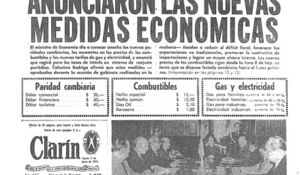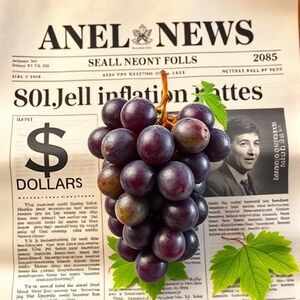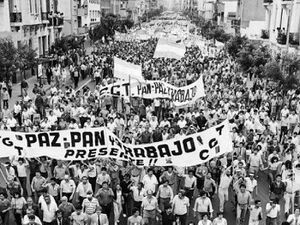Ricardo Álvarez: Difference between revisions
No edit summary |
No edit summary |
||
| (6 intermediate revisions by the same user not shown) | |||
| Line 2: | Line 2: | ||
'''Toronto, ON''' | |||
'''December 17th, 2085''' | '''December 17th, 2085''' | ||
| Line 11: | Line 11: | ||
I barely recognize Toronto anymore. The world feels heavy these days, and when I look out my apartment’s window, I grow fatigued by the never-ending gray skyline. While winters have become oddly mild these last few years, this season has brought this dreadful mix of dry air and biting frost that sends shivers down my spine. The heating bill came in the mail yesterday, and I had to lay down when I read that total — $1270 for the month, with estimates of a 15% rise by mid-January. I’m telling you Santiago, this city is for the rich now. I’ve poured over the energy sector’s market forecasts, and that outlook is grim. It really doesn’t look too good, honestly. They’re saying there’s geopolitical disputes over the Arctic drilling rights to Hans Island between us and Denmark. It’s costing us an arm, a leg, and probably a kidney! I guess the Danes are struggling with this inflation too, but esto es un robo, hermano! Anyways, the supply has tightened even further and the winter conditions are too harsh to fix heightened demands with just renewable energy. The meteorologists predict another polar vortex hitting late December and the thoughts of my radiator failing weighs heavily on my mind. You always said Toronto is Toronto mi amigo, but it’s not like that anymore. | I barely recognize Toronto anymore. The world feels heavy these days, and when I look out my apartment’s window, I grow fatigued by the never-ending gray skyline. While winters have become oddly mild these last few years, this season has brought this dreadful mix of dry air and biting frost that sends shivers down my spine. The heating bill came in the mail yesterday, and I had to lay down when I read that total — $1270 for the month, with estimates of a 15% rise by mid-January. I’m telling you Santiago, this city is for the rich now. I’ve poured over the energy sector’s market forecasts, and that outlook is grim. It really doesn’t look too good, honestly. They’re saying there’s geopolitical disputes over the Arctic drilling rights to Hans Island between us and Denmark. It’s costing us an arm, a leg, and probably a kidney! I guess the Danes are struggling with this inflation too, but esto es un robo, hermano! Anyways, the supply has tightened even further and the winter conditions are too harsh to fix heightened demands with just renewable energy. The meteorologists predict another polar vortex hitting late December and the thoughts of my radiator failing weighs heavily on my mind. You always said Toronto is Toronto mi amigo, but it’s not like that anymore. | ||
[[File:Ricardo Alvarez.jpg|thumb|Image of Ricardo Álvarez, senior financial analyst at PricewaterhouseCoopers International (PwC), Toronto]] | |||
I sift through the inflationary chaos and food shortages in Canada, and I remember those journals that mis abuelos y bisabuelos would write about their lives in Argentina during the economic collapses of the 1970s and 1980s. Have you read those accounts? Wasn’t your Tío’s family part of the protests? Accounts and stories about el corralito financiero, el Gobierno, la inflación galopante, where the people would protest in the streets about the economy, the Guerra sucia and the military junta. My bisabuelo used to talk about the plata que no alcanzaba — money that was never enough. They started printing money to contain the recession but instead of handling the debt crisis, it skyrocketed inflation to unprecedented costs. Mi abuelo worked as a baker in Buenos Aires, fighting to keep his shelves full as inflation in the city surged over 300%. My great-grandmother used to write that people would line up at the bakery from 5am, only to find out that bread price doubled by the time they reached the cash register. Then there was the Rodrigazo. They talked about how the peso lost 50% of its value overnight and salaries lost value as soon as they were deposited. | I sift through the inflationary chaos and food shortages in Canada, and I remember those journals that mis abuelos y bisabuelos would write about their lives in Argentina during the economic collapses of the 1970s and 1980s. Have you read those accounts? Wasn’t your Tío’s family part of the protests? Accounts and stories about el corralito financiero, el Gobierno, la inflación galopante, where the people would protest in the streets about the economy, the Guerra sucia and the military junta. My bisabuelo used to talk about the plata que no alcanzaba — money that was never enough. They started printing money to contain the recession but instead of handling the debt crisis, it skyrocketed inflation to unprecedented costs. Mi abuelo worked as a baker in Buenos Aires, fighting to keep his shelves full as inflation in the city surged over 300%. My great-grandmother used to write that people would line up at the bakery from 5am, only to find out that bread price doubled by the time they reached the cash register. Then there was the Rodrigazo. They talked about how the peso lost 50% of its value overnight and salaries lost value as soon as they were deposited. | ||
[[File:Rodrigazo argentina.jpg|thumb]] | [[File:Rodrigazo argentina.jpg|thumb|Argentinian newspaper from the 1970s documenting the Peso's decline in value and hyperinflation]] | ||
I can’t help but see parallels between those times and the life I’m currently living in Toronto. Back then, they said it was mismanagement, deceit and debt, that drove families to poverty, and forced many more to flee Argentina. Now, there’s talk of environmental crisis, trade wars, tariffs, climate change, geopolitical conflict that shook the Canadian economy. Here, inflation es un monstruo que no se puede domar. Food costs are growing beyond comprehension — $30 for grapes, $60 for mangoes, $77 for cheddar cheese, close to $150 for a kg of beef, close to $200 for chocolate! PwC has shifted my duties entirely; I’ve moved from growth strategies to defensive planning. All I do is interpret financial risks, predict budget overruns, and calculate inflation impacts based on changes in economy or climate. Clients don’t even care about maximizing their financial portfolios anymore; they care about protecting their assets from future economic declines. | I can’t help but see parallels between those times and the life I’m currently living in Toronto. Back then, they said it was mismanagement, deceit and debt, that drove families to poverty, and forced many more to flee Argentina. Now, there’s talk of environmental crisis, trade wars, tariffs, climate change, geopolitical conflict that shook the Canadian economy. Here, inflation es un monstruo que no se puede domar. Food costs are growing beyond comprehension — $30 for grapes, $60 for mangoes, $77 for cheddar cheese, close to $150 for a kg of beef, close to $200 for chocolate! PwC has shifted my duties entirely; I’ve moved from growth strategies to defensive planning. All I do is interpret financial risks, predict budget overruns, and calculate inflation impacts based on changes in economy or climate. Clients don’t even care about maximizing their financial portfolios anymore; they care about protecting their assets from future economic declines. | ||
[[File:Infaltion newspaper.jpg|thumb|Toronto Newspaper documenting the rates of inflation in 2085 for grapes ]] | |||
| Line 24: | Line 26: | ||
But it’s not just the changes at work that bother me, or the rising costs within the city. I’m 61 years old and hoping to retire soon. On a personal level, these inflationary rises have destroyed my own financial plans. I always dreamed of retiring in San Carlos de Bariloche with Lucía, purchasing a small vineyard facing the Andes, and just living off the savings we acquired over the years. Mateo would visit us when he’s done his Ph.D. But inflation has killed the value of every dollar I’ve saved. When I do retire, if I ever choose to, I’ll be grateful to afford un cartón de vino barato. I’ve calculated these projections thousands of times. I’ve recalculated the longevity risk and each scenario always finishes the same: I’m stuck in this office for at least another decade. | But it’s not just the changes at work that bother me, or the rising costs within the city. I’m 61 years old and hoping to retire soon. On a personal level, these inflationary rises have destroyed my own financial plans. I always dreamed of retiring in San Carlos de Bariloche with Lucía, purchasing a small vineyard facing the Andes, and just living off the savings we acquired over the years. Mateo would visit us when he’s done his Ph.D. But inflation has killed the value of every dollar I’ve saved. When I do retire, if I ever choose to, I’ll be grateful to afford un cartón de vino barato. I’ve calculated these projections thousands of times. I’ve recalculated the longevity risk and each scenario always finishes the same: I’m stuck in this office for at least another decade. | ||
[[File:Argentina protests.jpg|thumb|Crowds protesting the costs caused by the Rodrigazo in Argentina ]] | |||
Matteo and Florencia have turned to farming, as much of the younger generation has decided to do. Ironic, no? Our families dreamed of escaping the farm labour to pursue their goals in the city; now, kids are returning to the soil. Florencia planted cucumbers, tomatoes, green beans and peppers in their rooftop garden, and she’s taking these night classes to learn how to grow starchy vegetables. Matteo often brings us bags of their vegetables, so I’ve started to learn how to garden myself. Lucía is better than me though, and I guess she’s always been good at science. But work at the hospital has been hard for her too. People are turning to hazardous work and getting injured, kids are getting more colds than normal, and there’s tons of stress-related illnesses. They don’t have enough nurses to manage the ICU; she feels very overwhelmed. | Matteo and Florencia have turned to farming, as much of the younger generation has decided to do. Ironic, no? Our families dreamed of escaping the farm labour to pursue their goals in the city; now, kids are returning to the soil. Florencia planted cucumbers, tomatoes, green beans and peppers in their rooftop garden, and she’s taking these night classes to learn how to grow starchy vegetables. Matteo often brings us bags of their vegetables, so I’ve started to learn how to garden myself. Lucía is better than me though, and I guess she’s always been good at science. But work at the hospital has been hard for her too. People are turning to hazardous work and getting injured, kids are getting more colds than normal, and there’s tons of stress-related illnesses. They don’t have enough nurses to manage the ICU; she feels very overwhelmed. | ||
| Line 36: | Line 40: | ||
Ricardo Álvarez | Ricardo Álvarez | ||
References (consulted not directly cited) | |||
Béland, D., Dinan, S., Rocco, P., & Waddan, A. (2023). Social policy responses to rising inflation in canada and the united states. Social Policy and Society, 23(1), 163–175. https://doi.org/10.1017/s1474746423000222 | |||
Climate change impact on agriculture will vary significantly across Canada. (2024, June 28). Western Communications. Western University. https://news.westernu.ca/2024/06/our-warming-planet-agriculture/ | |||
Future food systems: Exploring global production, processing, distribution, and consumption: Canada’s food inflation story. (n.d.). ScienceDirect. Retrieved December 3, 2024, from https://www.sciencedirect.com/science/article/abs/pii/B9780443156908000175 | |||
Nunavut Bureau of Statistics (NBS). (2017). 2017 Nunavut Food Price Survey1 Price Comparisons Per Kilogram and Litre. https://www.gov.nu.ca/sites/default/files/documents/2022-11/2017_nunavut_food_price_survey_-_price_comparisons_per_kilogram_and_litre_report_1.pdf | |||
Oklahoma agriculture in the classroom. Retrieved December 3, 2024, from https://oklahoma.agclassroom.org/ | |||
Latest revision as of 05:32, 3 December 2024
The following letter was published in our agricultural anthology by financial journalist Santiago Herrera-Romero on January 12th, 2086. It details, with permission from his friend Ricardo Álvarez, the ongoing rise of inflationary pressures in Canada and the financial crisis faced by families:
Toronto, ON
December 17th, 2085
Estimado Santiago,
I barely recognize Toronto anymore. The world feels heavy these days, and when I look out my apartment’s window, I grow fatigued by the never-ending gray skyline. While winters have become oddly mild these last few years, this season has brought this dreadful mix of dry air and biting frost that sends shivers down my spine. The heating bill came in the mail yesterday, and I had to lay down when I read that total — $1270 for the month, with estimates of a 15% rise by mid-January. I’m telling you Santiago, this city is for the rich now. I’ve poured over the energy sector’s market forecasts, and that outlook is grim. It really doesn’t look too good, honestly. They’re saying there’s geopolitical disputes over the Arctic drilling rights to Hans Island between us and Denmark. It’s costing us an arm, a leg, and probably a kidney! I guess the Danes are struggling with this inflation too, but esto es un robo, hermano! Anyways, the supply has tightened even further and the winter conditions are too harsh to fix heightened demands with just renewable energy. The meteorologists predict another polar vortex hitting late December and the thoughts of my radiator failing weighs heavily on my mind. You always said Toronto is Toronto mi amigo, but it’s not like that anymore.
I sift through the inflationary chaos and food shortages in Canada, and I remember those journals that mis abuelos y bisabuelos would write about their lives in Argentina during the economic collapses of the 1970s and 1980s. Have you read those accounts? Wasn’t your Tío’s family part of the protests? Accounts and stories about el corralito financiero, el Gobierno, la inflación galopante, where the people would protest in the streets about the economy, the Guerra sucia and the military junta. My bisabuelo used to talk about the plata que no alcanzaba — money that was never enough. They started printing money to contain the recession but instead of handling the debt crisis, it skyrocketed inflation to unprecedented costs. Mi abuelo worked as a baker in Buenos Aires, fighting to keep his shelves full as inflation in the city surged over 300%. My great-grandmother used to write that people would line up at the bakery from 5am, only to find out that bread price doubled by the time they reached the cash register. Then there was the Rodrigazo. They talked about how the peso lost 50% of its value overnight and salaries lost value as soon as they were deposited.
I can’t help but see parallels between those times and the life I’m currently living in Toronto. Back then, they said it was mismanagement, deceit and debt, that drove families to poverty, and forced many more to flee Argentina. Now, there’s talk of environmental crisis, trade wars, tariffs, climate change, geopolitical conflict that shook the Canadian economy. Here, inflation es un monstruo que no se puede domar. Food costs are growing beyond comprehension — $30 for grapes, $60 for mangoes, $77 for cheddar cheese, close to $150 for a kg of beef, close to $200 for chocolate! PwC has shifted my duties entirely; I’ve moved from growth strategies to defensive planning. All I do is interpret financial risks, predict budget overruns, and calculate inflation impacts based on changes in economy or climate. Clients don’t even care about maximizing their financial portfolios anymore; they care about protecting their assets from future economic declines.
Do you remember when we were in university and abuela would talk about the dólar blue — Argentina’s black market currency? She’d tell us stories about how the corralito made the peso so unstable, it wouldn’t be allowed in shops anymore. Shopkeepers wouldn’t accept it anymore so they’d use dólar blue? I feel that same distrust creeping into Canadian shopping centres. People hold on to produce, hoard commodities and steal after hours, since they recognize that money buys less and less each day, it’s plata que no alcanzaba — our money never stretches far enough anymore. Gold is back in business…people are scrambling for some type of hedge fund against the unpredictability of inflation. The stock market, however, is an illustration of societal panic. Every report is a survey on a company’s survival rate, or its ability to fight rising costs, broken supply chains and despicable weather conditions. I can’t even describe the food corporations, as they have absolutely taken the worst hit — agricultural yields are short, commodity markets in turmoil, droughts in Alberta all harvest season, tariff wars, floods in the Maritimes, rising costs for desalination farms have elevated wheat costs. You know me, I used to believe in the efficient market hypothesis, pero ahora Santiago, los mercados están en total desorden.
But it’s not just the changes at work that bother me, or the rising costs within the city. I’m 61 years old and hoping to retire soon. On a personal level, these inflationary rises have destroyed my own financial plans. I always dreamed of retiring in San Carlos de Bariloche with Lucía, purchasing a small vineyard facing the Andes, and just living off the savings we acquired over the years. Mateo would visit us when he’s done his Ph.D. But inflation has killed the value of every dollar I’ve saved. When I do retire, if I ever choose to, I’ll be grateful to afford un cartón de vino barato. I’ve calculated these projections thousands of times. I’ve recalculated the longevity risk and each scenario always finishes the same: I’m stuck in this office for at least another decade.
Matteo and Florencia have turned to farming, as much of the younger generation has decided to do. Ironic, no? Our families dreamed of escaping the farm labour to pursue their goals in the city; now, kids are returning to the soil. Florencia planted cucumbers, tomatoes, green beans and peppers in their rooftop garden, and she’s taking these night classes to learn how to grow starchy vegetables. Matteo often brings us bags of their vegetables, so I’ve started to learn how to garden myself. Lucía is better than me though, and I guess she’s always been good at science. But work at the hospital has been hard for her too. People are turning to hazardous work and getting injured, kids are getting more colds than normal, and there’s tons of stress-related illnesses. They don’t have enough nurses to manage the ICU; she feels very overwhelmed. I recall my grandfather writing about the cacerolazos, but now these protests happen all over Toronto. Parents are protesting outside of schools, demanding school lunches and meal plans for their children. They don’t offer cafeteria food these days, or what they do give goes to the wealthy. I understand it in a way because I loved those Choripán sandwiches as a kid at school. All the kids are learning how to plant now too, Matteo was working as a TA for an undergraduate chemistry class at U of T, and all their laboratories are based on regulating soil pH and testing fertilizers. Remember when farm work was what parents wanted to keep out of schools? They wanted to give their children a city education. Times have changed now mi amigo.
Sometimes, I think about mis abuelos y bisabuelos and how hard they worked to survive the fall of Argentina’s economy. Their journals detailed the struggles of their homelands: pooling resources with neighbours to feed their families, learning to ration food over long durations of time, and exchanging certain food products for others. Their journals showcased a testament of their strength and determination during a challenging time. However, even resilience has limitations. Each day at work, I see the faces of my colleagues — exhausted by long hours, restless nights and diminishing paycheque. I see it in my own eyes, and in the reflection of a man who has dedicated his life to balancing accounts, only for the projections to falter. Truthfully Santiago, I’m not sure how this ends. Nothing in university or my work experience has prepared me to understand society’s current state, or the instability of these inflation rates. I can predict financial forecasts and probabilities but I can’t know what’s happening in this mess. Toda la teoría se queda corta frente a esto, it’s hopeless. But I know one thing, mi amigo, they’ll write about this in journals like they wrote about the Rodrigazo in Argentina.
Well, I’ve rambled too much again, but I’ll leave you with this: stay safe and keep your eyes open. I hope you and your family are doing well, and finding some peace in San Francisco.
Con esperanza y fuerza,
Ricardo Álvarez
References (consulted not directly cited)
Béland, D., Dinan, S., Rocco, P., & Waddan, A. (2023). Social policy responses to rising inflation in canada and the united states. Social Policy and Society, 23(1), 163–175. https://doi.org/10.1017/s1474746423000222
Climate change impact on agriculture will vary significantly across Canada. (2024, June 28). Western Communications. Western University. https://news.westernu.ca/2024/06/our-warming-planet-agriculture/
Future food systems: Exploring global production, processing, distribution, and consumption: Canada’s food inflation story. (n.d.). ScienceDirect. Retrieved December 3, 2024, from https://www.sciencedirect.com/science/article/abs/pii/B9780443156908000175
Nunavut Bureau of Statistics (NBS). (2017). 2017 Nunavut Food Price Survey1 Price Comparisons Per Kilogram and Litre. https://www.gov.nu.ca/sites/default/files/documents/2022-11/2017_nunavut_food_price_survey_-_price_comparisons_per_kilogram_and_litre_report_1.pdf
Oklahoma agriculture in the classroom. Retrieved December 3, 2024, from https://oklahoma.agclassroom.org/



